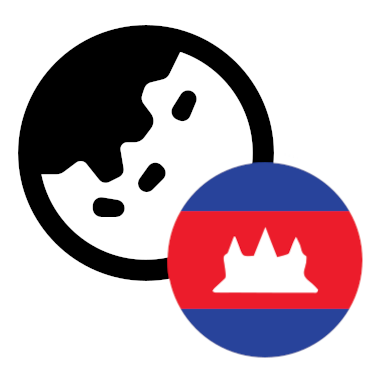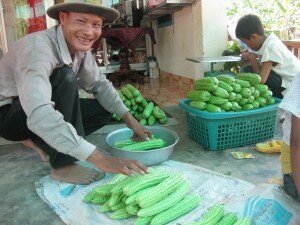
Equitable development for all
Cambodia has experienced significant economic development over the past decades. However, development indicators reveal that at least 30 percent of Cambodia’s population still lives below the poverty line. This is coupled with the fact that an estimated 90 percent of the poor live in rural areas and the majority relies on agriculture for their livelihoods.
As Cambodia’s economy begins to take off, we strive to ensure that the rural poor are not left behind. Our support in rural development is focused on regional economic development and land sector reform.
Investing in rural infrastructure and rural electrification and developing capacities of rural enterprises and public and private sector institutions: These are the areas where we focus our commitment to Cambodia’s regional economic development. Our aim is to eradicate poverty.
We finance the construction of rural roads, marketplaces and bridges and provide technical support to the Government in their effort to introduce a countrywide road maintenance system. With better and all-season roads, farmers have easier access to markets, while students and patients can more easily access schools and health care facilities. This leads to a significant increase in local incomes, higher school completion rates and reduction of gender gaps in access to education and other public services.
With limited access to electricity, everyday life is difficult. By supporting the Royal Government of Cambodia with technical expertise and investments in the national electricity grid, households have fewer burdens, less cost and an easier daily life and work than before. As a result, women have more chances to access to formal economy and become more active in the public sphere.
We advise public and private sector decision-makers on measures to promote pro-poor growth. We foster better cooperation within value chains, promote partnerships between the public and private sectors and capacitate business federations to provide services to their members. Through better access to technical know-how and innovations, thousands of female and male rural entrepreneurs increase the volumes and the competitiveness of their products and access new markets. This contributes to agricultural growth and increased rural employment of women and men that are crucial for poverty reduction.
Access to land is one of the crucial areas for the development of any agricultural-based economy. This also includes the realization of the human right to food. Therefore, we support Cambodia in their comprehensive land sector reform. Major components of this reform aim at a transparent system of land administration, secure land tenures as well as distribution of land to the landless.
Bio-agriculture Input Sector Pushes ‘Green Center’ Forward in Cambodia
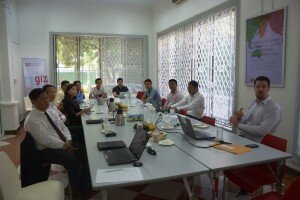 04 August 2014
04 August 2014
Phnom Penh, Cambodia –Six private and social business companies leading the local market in providing inputs for agriculture and trainings in organic agriculture sent eleven of their representatives to join GIZ for a consulation this week. GIZ ASEAN Sustainable Agrifood Systems (Biocontrol) program hosted the consultation with local companies to discuss moving the concept of a ‘green center’ in Cambodia forward. The new center will aim to bring bio-agricultural companies under one roof, to provide their high quality inputs for a sustainable and environment friendly sound agriculture. Open to the public, the center plans to act as platform for training and dialog activities for national and international development partners, extension workers and farmers, and will provide seminars to consumers interested in learning about agriculture and urban gardening.
To push their vision forward, the participants of the workshop developed an action plan to map out the next steps for the center.
Companies that joined the consultations have the common aim to promote sustainable agriculture with little or no chemical (organic) use. These companies include Bayon Heritage Holding Group Co, Ltd., Angkor Green Investment and Development Co. Ltd., EX-M (Cambodia) Co. Ltd., iDE Cambodia, and Entrée Baitang Co. Ltd., which met at the Cambodian Center for Study and Development in Agriculture (CEDAC).
For more information on the development of Cambodia’s first ‘Green Center’ contact:
Mr. Claudius Bredehöft
National Project Coordinator Cambodia
ASEAN Sustainable Agrifood Systems (Biocontrol)
Deutsche Gesellschaft für Internationale Zusammenarbeit (GIZ) GmbH
M +855 12 21 54 30
Organic Food Certification Gives Consumers Confidence to Go Organic
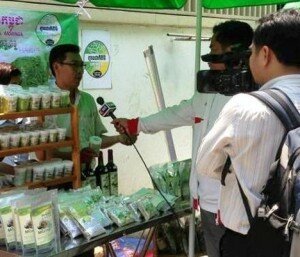
Display of certified organic products during COrAA’s 2nd Organic Fair, March 2014
11 August 2014
Phnom Penh, Cambodia – Issues of food safety and nutrition have become a part of public discussions in many countries. Also in Cambodia, the number of people who are concerned about the quality of food and make an effort to consume safe and healthy foodstuff is continuously increasing. When in search of wholesome food, organic is the best option. However, many people rightfully ask, “How do we know that it is really organic? How can we trust claims that certain rice, fruits or vegetables were produced organically?” Commonly, certification of producers and processors is the means to enable consumers to trust products.
To gain consumer trust in organic products, the Cambodian Organic Agriculture Association (COrAA), with support from GIZ, is developing a certification system for the domestic market. To independently certify processes throughout the value chains for organic, chemical-free or other food production standards has been the founding mission of COrAA since 2006. However, it was only in 2010 that COrAA started to conduct inspections and to develop a certification system. Currently over 30 producers have obtained certification based either on the Standard for Organic Crop Production or the Standards for Chemical-free Crop Production.
On request, COrAA sends an independent inspector to inspect the farm, plantation, or food processing operations. Farmers are inspected individually, or in a group. Smallholders usually
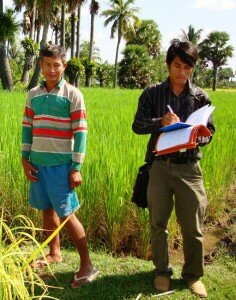
An inspector, accompanied by the owner, checks an organic rice field.
join an organic producer association or a cooperative, which have set-up an Internal Control System to safeguard the integrity of the organic quality of their products.
All persons dealing with the products are identified, registered, instructed on the requirements for organic certification and contracted to ensure compliance. The activities of the persons involved are then monitored in a system of regular visits and documentary control. The inspectors of the group visit every field at least twice during the growing season and record their findings. COrAA’s inspectors check if the group can manage its control system. During the inspection they check different areas of the farms at random.
Farms and processors are inspected once a year, while organic vegetable producers are examined twice a year. However, certification bodies also have to conduct unscheduled inspections to assure that producers follow standards. During the audit, the inspector assesses the producer’s understanding of basic organic farming rules and tests for the possible contamination of organic fields with chemicals from adjacent fields. Then, the inspector will check the fields and all storage facilities, including the farmer’s house. The findings are summarized in the inspection report. Deviations or non-conformities and corrective measures will be pointed out. The COrAA-assigned inspector has to discuss the findings with the farmer or operator.
After this, the inspection report is submitted to the Certification Committee, which is composed of three people independent from COrAA. Based upon the review, the committee will decide if certification can be granted. COrAA can reject an application for certification if the respective standards were not met, or if they were violated.
Certification is expressed to the public by COrAA’s certification marks, also known as labels. These are marks of conformity, not to be confused with trademarks. A mark can only be used on products which come from farms that have been certified based on one of COrAA’s standards.
COrAA strives to further professionalize its certification system by upgrading the skills of the inspectors and the certification managers as well as by further defining the certification processes. In addition to cooperating with regional certification bodies that are members of the Certification Alliance (CertAll), COrAA is also working towards the recognition of its certification system by other ASEAN member countries. In the future, COrAA hopes to offer certification for international markets such as the EU at reasonable costs through CertAll members, which have obtained respective accreditation.
The Certification Alliance includes members from China, India, Nepal as well as several ASEAN countries. The aim is to improve exporting conditions for Cambodian organic products to reach buyers in the region.
COrAA is also preparing the certification for food products obtained through ‘wild collection’, such as honey. Commercial inputs for organic agriculture, such as organic fertilizers, are another area of concern. Furthermore, COrAA currently prepares guidelines for organic inputs to enable the certification of such products.
For more information, please contact Mr. Winfried Scheewe (email: [email protected]).
Nearly there – Final Land Policy Consultation a Success
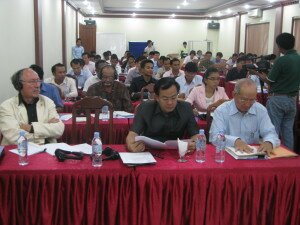
Participants listen during the last consultation workshop on the White Paper on Land Policy
20-21 May 2014
Sihanoukville, Cambodia – “The workshop was a clear success. Therefore, we can go ahead and finalize the draft of the White Paper on Land Policy in the next weeks in order to submit it for approval by the Council of Ministers in the third quarter of 2014,” said Cambodian Secretary of State Lim Voan.
Mr. Voan made this statement in his closing words of the final public consultation workshop on the White Paper on Land Policy in Sihanoukville, thanked all representatives of more than 15 ministries, and an impressive number of NGOs that contributed to workshop discussions.
An achievement for Cambodia, the ‘White Paper’ is internationally seen as the supreme policy on sustainable and just land use and land rights. Additionally, it outlines the government’s direction on land administration and management. In November 2014, the White Paper is planned to be presented by Senior Minister Im Chhun Lim.
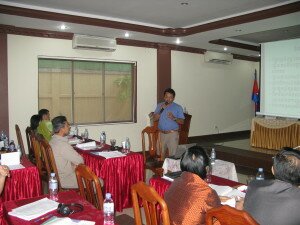
Mr. Phann Sithan from NGO-Forum facilitates a group discussion on the White Paper
At this recent workshop, more than 80 experts discussed the White Paper draft for two consecutive days. This draft is a result of five years of consultations and discussions among experts and policy makers. As in previous consultation workshops, GIZ provided flexible moderation, which gave enough time for discussion and group work. As a result, the participants involved themselves actively in the discussions during the full two days. Five years after the approval of the Declaration on Land Policy in 2009, Cambodia will finally have a comprehensive land policy.
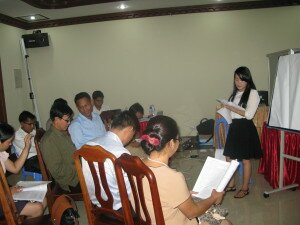
Ms. Touch Setha from NGO-Forum facilitates a group discussion
Technical Advisor to the former Council of Land Policy and Land Expert Prof. Dr. Ing. Holger Magel – who provided guidance on the White Paper development during the entire process – underlined in his closing remarks that the White Paper process was itself a model of good governance, thanks to very transparent procedures and broad participation. Regarding the contents and quality of the White Paper, Magel expressed his satisfaction that, in his opinion, all relevant international standards in terms of land governance, and respective land tenure and other rights were intensively discussed and presented. It is expected that this comprehensive land policy will have a far reaching multiplier-effect throughout the country.
As a result, all government agencies, private-sector companies, and the public will receive information on land rights and their responsibilities. There is also no doubt that the White Paper is fundamental for the implementation of Cambodia’s upcoming sustainable development goals.
Trust and Control – Consumer Field Trip to where the food is grown
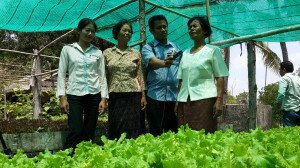
Media interviewed Ms. Tiv Chhat a farmer from Thmor Reap village, Pong Ror Commune, Rolea Baear District.
22 March 2014
Kampong Chhnang – Forty-one costumers of Natural Agri-Products shops (NAP), a social-business branch of the Center for Study and Development in Agriculture (CEDAC) in Phnom Penh, joined a one-day field trip to Kampong Chhnang province to see where their food is sourced. The field trip, including local media, visited organic vegetable produces in Thnoung Kambot village; Svay Chhroum commune and Thmor Reap village; Dok Kroung village; and Pong Ror commune of Rolea Baear District.
The visit is part of CEDAC’s Participatory Guarantee System (PGS) – a locally focused quality assurance system. The consumers certify producers based on active participation and foundation of trust, transparent relationships and dialogue as well as knowledge exchange.
Consumers learned the behind-the-scenes of organic farming and biological control approaches to agriculture. The Cooperation between CEDAC and the GIZ project ASEAN Sustainable Agrifood Systems (Biocontrol) supports farmers to strengthen their knowledge on irrigation techniques, organic fertilizer production, protection of useful insects (predators) and application of other useful Biocontrol Agents (BCA) like Trichoderma Harzianum.
The customers of the NAP shops in Phnom Penh enjoyed the trip out of the city and actively discussed organic agriculture, health and environmental issues with farmers and the advisors from CEDAC and GIZ.
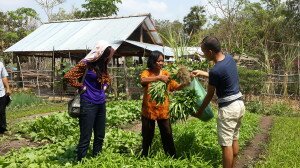
Consumers bought fresh products from Ms. Chan Simoeun, farmer in Thnoung Kambot village Svay Chhrum Commune, Rolea Baear District
The participants of this field visit are now 100% confident of product origin and quality of the organic vegetables available in eight NAP shops in Phnom Penh. They want to share their impressions with their friends and relatives as well.In addition to the consumer field trips, CEDAC and GIZ are introducing a new Documentation Handbook for farmers, which is based on IFOAM Standards – an internationally applicable organic standard that can be used directly for certification. The farmers have to document every input and activity for their production. The data is controlled and verified first by commune leader, then by the internal inspector, and finally by the ICS Supervisor in CEDAC Headquarters. Trust and Control are going hand in hand.Visit NAP on facebook: https://www.facebook.com/CEDACNAP
Contact:
Claudius Bredehöft
National Project Coordinator Cambodia
ASEAN Sustainable Agrifood Systems (Biocontrol)
Mobil: +855 12 21 54 30
Email: [email protected]
Development Partnerships: Experience Exchange
6 December 2013
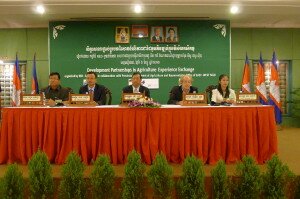
Opening ceremony of the workshop, Development Partnerships in Agriculture: Experience Exchange, organized by the RED-Green Belt programme of GIZ in collaboration with Provincial Department of Agriculture and the representative office of East West Seed International Ltd
SIEM REAP – On 6 December 2013, a workshop on development partnerships was held in Siem Reap. The event was facilitated by GIZ programme for Regional Economic Development (RED) – Green Belt and organised in collaboration with Provincial Department of Agriculture (PDA) and the representative office of East West Seed International Ltd. (EWS).
The workshop brought together over 40 representatives from the public and private sectors as well as development agencies operating in Cambodia. Participants presented and discussed on-going development partnerships, i.e. collaboration agreements between agricultural input companies, on the one hand, and government or development agencies, on the other.
The event built on the experience of RED and its partners in the implementation of development partnerships in Siem Reap province since 2009. The Provincial Department of Agriculture (PDA) Siem Reap, EWS and the NGO Agricultural Development Denmark Asia (ADDA), among others, presented achievements and lessons learned from partnership initiatives that matured in the framework of RED. The representatives of Provincial Departments of Agriculture from Kampong Cham, Kampong Chnang and Kanda shared their perspectives as well.
Participants expressed agreement on the effectiveness of development partnerships as a tool to engage the private sector in the role of a know-how provider in agriculture. Similarly, private sector representatives shared the view that development partnerships can fit in their long-term commercial strategies.
Discussion unfolded on the challenges faced by public and private sector stakeholders and on ways forward. All participants stressed the difficulties involved in the identification of the “right” partner and advocated for a “brokering function” as RED has played in Siem Reap. Secondly, trust, transparency and clear communication procedures were identified as cornerstones of a successful partnership. Finally, participants debated on the contributions and functions that each partner should bear and expect. Lack of clarity on such matter is, in everyone’s opinion, a reason for failure.
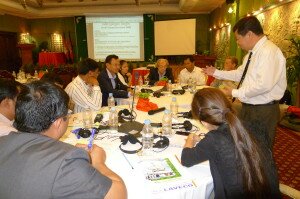
Group discussion on benefits and challenges of development partnerships. Participants discuss success factors and limitations of public-private collaboration agreements and their effectiveness as vehicles to deliver services to farmers and producers.
The need for a policy framework that enables and regulates development partnerships also led to discussion. On this matter, the representative of the Ministry of Agriculture, Forestry and Fisheries (MAFF), Dr. Mak Soeun, emphasised that partnerships with the private sector are already endorsed by government policies, while guidelines for their design and implementation still need formulation.
In conclusion, partnerships with private sector were recognised to play a significant role to promote access to know-how and innovations in agriculture, and increasingly so, as the public sector progressively embraces regulation, facilitation and coordination functions. However, challenges still lay ahead and further experience exchange will be required to establish guidelines and models that will orient development partnerships in the future.
5th International Summer School in Phnom Penh – Crowned by success!
6 November 2013
The end of the two-day International Summer School in Phnom Penh welcomed many satisfied faces, and all voiced positive feedback.
The Summer School took place from 5-6 November 2013. It is organized every year by the Ministry of Land Management, Urban Planning and Construction, the Royal University of Agriculture – Faculty of Land Management and the Technical University Munich; supported by GIZ Land Rights Programme.
This year’s Summer School was chaired by H.E. Im Chhun Lim, Senior Minister of Land Management, Urban Planning and Construction. It focused on the topic, “Strategic Spatial Planning: Responding to Territorial Development Challenges in Rural Areas”. About 22 high quality speeches and presentations of national and international experts from Lao PDR, the Philippines, the Socialist Republic of Vietnam and Germany provided a strong foundation for further discussions with panelists and the audience.
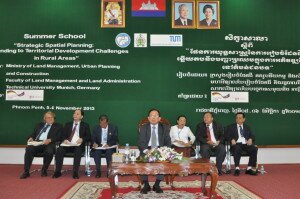
The picture shows H.E. Im Chhun Lim, Senior Minister Land Management, Urban Planning and Construction (in front). From left: Dr. Franz-Volker Müller, Program Manager GIZ Land Rights Program; H.E. Pen Sophal, Secretary of State; H.E. Lim Voan, Secretary of State; H.E. Ou Vuddy, Secretary of State; H.E. Sar Sovann, Secretary of State; H.E. Seak Vanna, Undersecretary of State.
Discussions touched upon some of the most important topics for developing and emerging countries: How to mitigate the rural-urban migration? How to avoid the rural exodus? How to strengthen rural areas in terms of social and physical needs of the population? How to create jobs in rural areas and transform dormant rural towns to lively rural centers? And, what role does comprehensive spatial planning play to respond to these various challenges mentioned above?
In order to respond to these challenges, participatory planning activities are of utmost importance. However, coordination, cooperation and communication among all stakeholders are necessary preconditions. The role of all stakeholders must be clarified and they should actively take part and contribute to the common objective. In his summary, Prof. EoE Holger Magel remarked, “It’s all about People and Land!”
The Summer School was attended by more than 150 persons from national and sub- national government institutions, international experts, NGOs, students and representatives of the private sector.
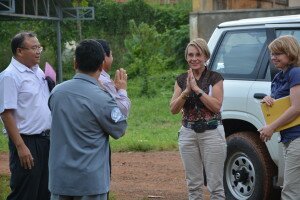 October 2013
October 2013
Mondulkiri/Kampong Cham, Cambodia – In preparation for the governmental consultations on October 17, the continued German support to the Land Administration, Management and Distribution Program (LAMDP) was the occasion for an informative joint field visit to Mondulkiri and Kampong Cham provinces. The international delegation comprised the Desk Officer for Cambodia of the German Federal Ministry for Economic Cooperation and Development (BMZ), Ms. Stefanie Ruff, alongside several participants from the German Embassy, the Embassy of Finland, European Union (EU), KfW Development Bank, GIZ Cambodia, FINNMAP, ILO and representatives of local NGOs. The field visit was organized by the Ministry for Land Management, Urban Planning and Construction (MLMUPC), Provincial Authorities from Mondulkiri and Kampong Cham together with Provincial Land Department of Mondulkiri and Kampong Cham and the GIZ Land Rights Program.
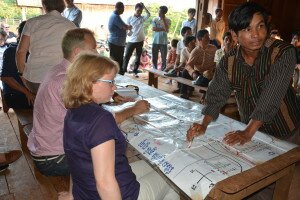
While also introducing into the work of the provincial cadastral offices on systematic land registration, the focus of the first half of the field visit was the support to indigenous people’s (IP) communities land registration in Mondulkiri province. The delegation visited the IP communities in Sre Khtom and Oo’Rona and learned about their experiences and involvement with the process of land registration, which had led to the issuance of collective titles for these communities.
A visit to two indigenous Bou Sra communities highlighted as well the difficulties of IP land registration to the delegation. The IP of the villages in Lmes and Poulu articulated their concern with multiple conflicts pertaining to their land boundaries, while not having received a collective title yet. It became very clear that resolution of conflicts during IP communities land registration is a complicated and lengthy process that needs further support.
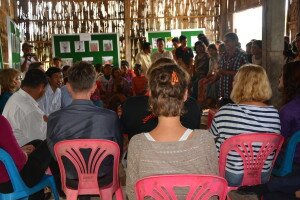 The second half of the 3-day field visit, focused on reviewing the situation of land recipients on social land concessions in Kampong Cham province. While still poor, the land recipients showed to the delegation members in which manifold ways they were able to improve their livelihoods. As a side event, a pre-cut of a short film about a photo-documentation by famous war photographer Tim Page was screened in the community hall. The film stars several of the villagers, which squeezed into the community hall, next to the delegation team, to watch themselves and their fellow villagers on the screen.
The second half of the 3-day field visit, focused on reviewing the situation of land recipients on social land concessions in Kampong Cham province. While still poor, the land recipients showed to the delegation members in which manifold ways they were able to improve their livelihoods. As a side event, a pre-cut of a short film about a photo-documentation by famous war photographer Tim Page was screened in the community hall. The film stars several of the villagers, which squeezed into the community hall, next to the delegation team, to watch themselves and their fellow villagers on the screen.
The topics and lessons learned from the field visit were picked-up again during the governmental consultations and contributed by informing on agreed proposals, e.g. on the further strengthening of the support to IP communities land registration and post-project support to the German-supported land recipients.
For more photos, please visit: http://on.fb.me/1gtIrlM
Organic Farmer Assembly Marks Progress, Plans for Future
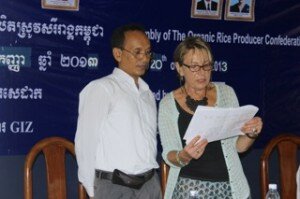
19-20 September 2013
Phnom Penh—As organic rice production continues to expand in Cambodia, the Cambodian Center for Study and Development in Agriculture(CEDAC) and GIZ are working to ensure that farmers are properly supported to reap the benefits of organic agriculture. To this end, the Second General Assembly of the National Organic Rice Producer Confederation in Cambodia was held on September 19-20, 2013 at CEDAC’s head office in Phnom Penh. Over 50 rice farming community representatives participated in the meeting. Mr. Keam Makarady, CEDAC Director of Health and Environment and Mr. Claudius Bredehoeft, National Project Coordinator for GIZ ASEAN Biocontrol (ABC) for Sustainable Agrifood Systems facilitated the meeting.
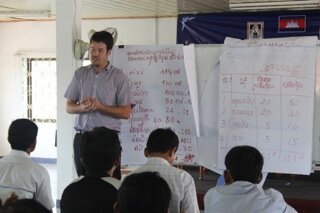 Dr. Ludgera Klemp, Counsellor and Head of Cooperation at the German Embassy delivered the Opening Remarks in Khmer. She spoke about the German government’s long support for CEDAC, saying “it’s a pleasure to look back on the established cooperation with CEDAC since 2003 and the progress made through technical support for organic agriculture and market development for farmers since then.”
Dr. Ludgera Klemp, Counsellor and Head of Cooperation at the German Embassy delivered the Opening Remarks in Khmer. She spoke about the German government’s long support for CEDAC, saying “it’s a pleasure to look back on the established cooperation with CEDAC since 2003 and the progress made through technical support for organic agriculture and market development for farmers since then.”
The assembly’s primary objective was to generate the 2013-2014 organic rice production plan. But according to Mr. Bredehoeft: “This meeting is also about sharing knowledge about the situation in the fields, in the market, and this year’s rice production.” In addition to reviewing the numbers of organic farmers, respective yields and the Fair Trade premium available to certified groups, participants were encouraged to discuss their successes and challenges. “It is very important that we learn from each other,” Mr. Bredehoeft stressed.
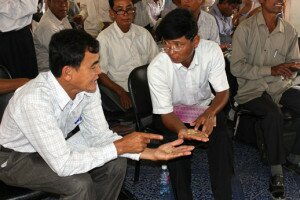
Other presenters included CEDAC President, Dr. Yang Saing Koma and Mr. Sou Savorn, CEDAC Sahakreas Operations Manager. Dr. Koma gave an overview of the essential System of Rice Intensification practices as well as the Fair Trade and organic certification processes, explaining how the farmers can benefit from this linked system.
Author: Mr. Alexander Davis
Ministry of Planning conducts forum to promote IDPoor Database
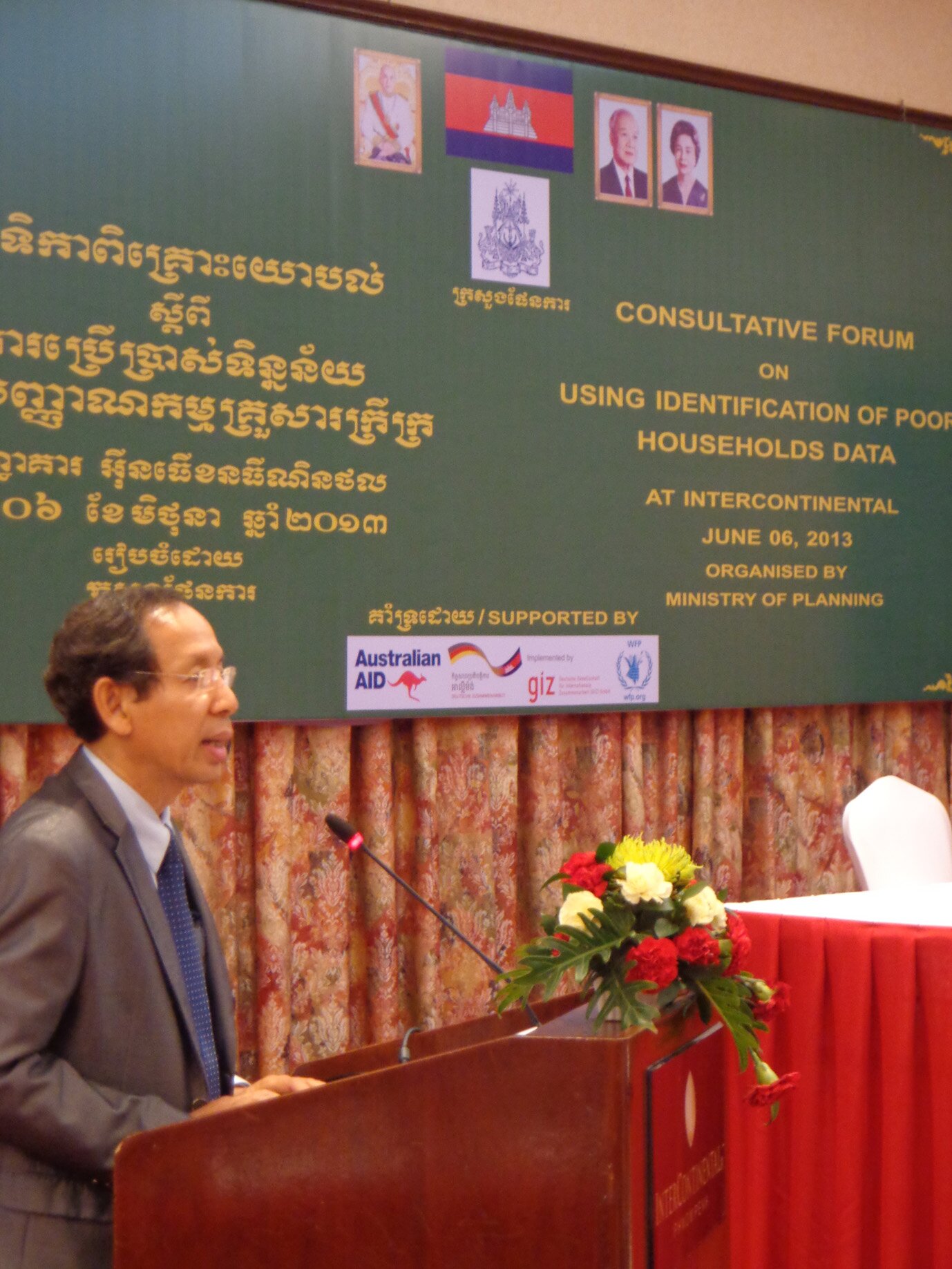
6 June 2013
Phnom Penh, Cambodia On June 6, the Cambodia’s Ministry of Planning, with support from GIZ and the United Nations World Food Programme (WFP), conducted a consultative forum on the use of the different information sources and data products offered by the Identification of Poor Households (IDPoor) Programme. Excellency Tuon Thavrak, Under-Secretary of State, Ministry of Planning opened the forum, underlining the importance of the IDPoor data, which is used by a growing number of organizations and poverty-reduction programmes as a tool for efficient poverty targeting.
The forum aimed to collect feedback from a group of key stakeholders including Government agencies, bi- and multi-lateral donor organizations, as well as non-governmental organisations, on the usability of different existing formats (website, data DVD, IDPoor Atlas) of IDPoor and how they could be further improved. Participants also had the chance to provide feedback on potential data products linked to an online database, which GIZ supports the Ministry of Planning develop. Last but not least, participants had the opportunity to inform the Ministry of Planning what additional types of data, reports and formats they would like to have and need for their work. Ideas included services to poor households, and support to plan their programmes, monitor progress or prepare reports.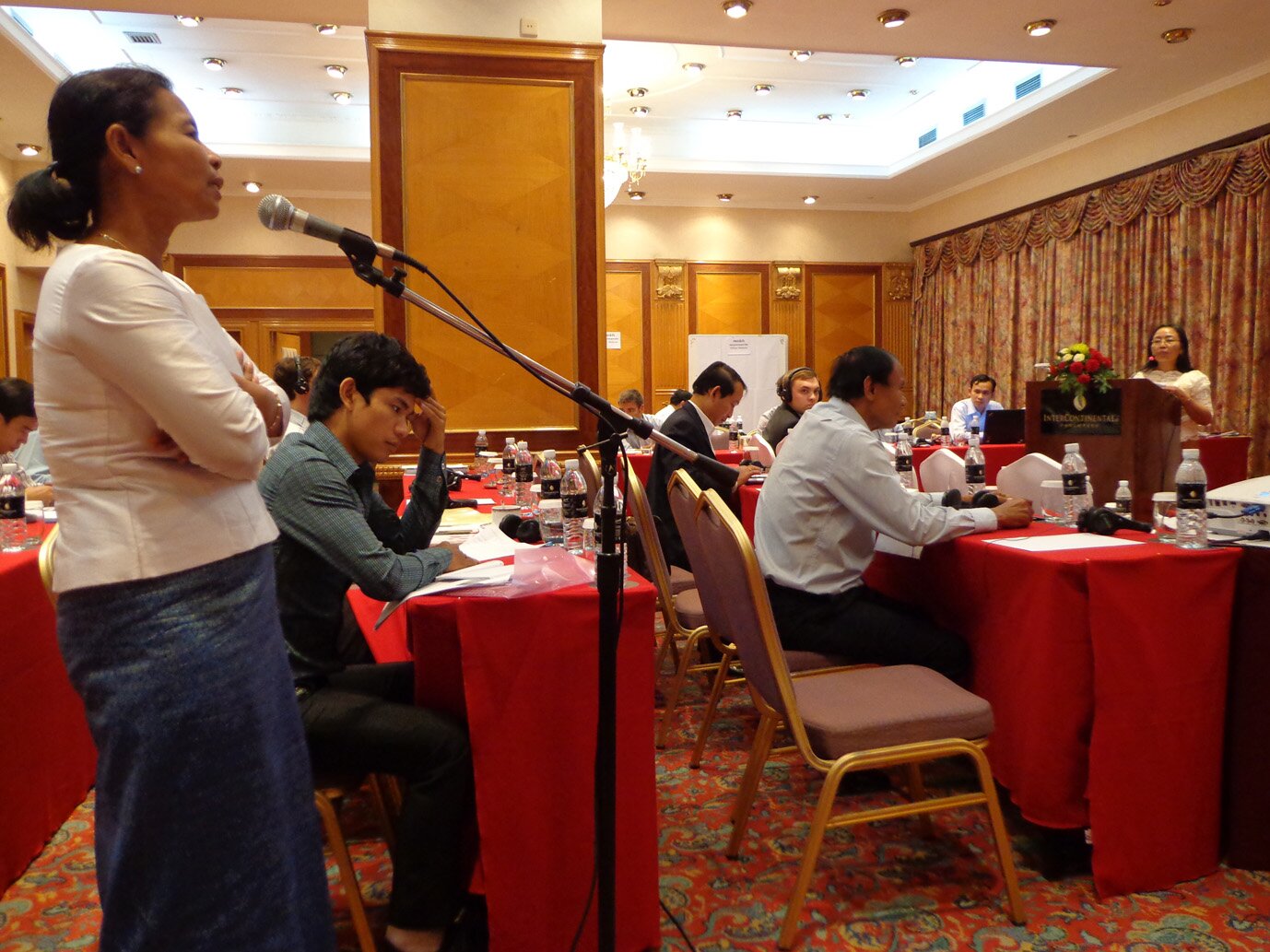
Most participants agreed that the IDPoor data is very useful for their work and appreciates that the Ministry of Planning provides access to this information. However, some organisations – specifically smaller organisations at subnational level – still face difficulties finding the most up-to-date information, as well as extracting and analyzing the data that they need for their work. Therefore, participants welcomed the idea of making more information available online in the future and the Ministry of Planning’s efforts to include new, more user-friendly features.
The feedback and recommendations received during the Consultative Forum complement the feedback received from a larger group of organizations from an online survey designed by GIZ and disseminated by Ministry of Planning in May. The feedback from the Forum and the online survey will be used to make IDPoor information and data formats easier to use and better fitted to the different users’ needs. This will help promote the utilisation of IDPoor data as the primary basis for identifying poor beneficiaries and targeting development programmes to the households and areas that are most in need of support.
The “Support to the Identification of Poor Household’s Programme” implemented by GIZ is funded by German Development Cooperation and Australian Aid.
For further information on the IDPoor Programme please visit: http://www.mop.gov.kh/Projects/IDPoor/tabid/154/Default.aspx
Rising Demand Boosts Organic Rice Industry
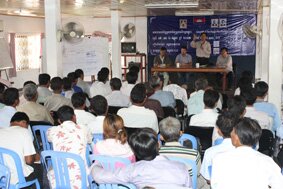
10 July 2013
Phnom Penh, Cambodia Production of Cambodian organic rice is rising rapidly as international demand for the product increases, experts said at a forum for growers and other industry members held Tuesday at the Phnom Penh headquarters of agricultural NGO Cedac.
“In the first six months of this year we’ve exported about 200 tons of organic rice, which is about double last year’s figure,” said Cedac president Yang Saing Koma, adding that farmers aren’t producing enough to meet demand. “We hope that by next year, we’ll be exporting 1,500 tons annually.”
Although there are about 100,000 farmers who produce organic rice in Cambodia, only about 200 meet international standards, Mr. Saing Koma said.
He said Cedac hopes the number of certified organic farmers will rise to 700 by next year, but certification is a strict, three-year-long process, and farmers who are certified are subject to annual inspections thereafter.
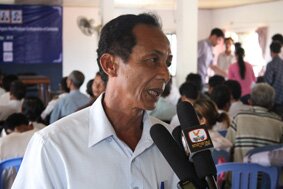
Claudius Bredehoeft, national project coordinator for the regional program ASEAN Biocontrol for sustainable Agrifood Systems of GIZ, the international development arm of the German government, said at the forum that Cambodian farmers are well-positioned to carve out a niche in the rice market. GIZ together with CEDAC is building up the organic rice value chain for the national and international market since 2003. The organic production is preserving the soil fertility on the one hand and supports the farmer to save the costs for chemical inputs on the other. Through the organic and fair-trade certification and market driven approach the farmers are increasing their income as well.
“Since Thailand has introduced minimum rice prices, and Cambodia can export tax-free to the E.U., it has advantages Thailand and Vietnam do not,” he said. “With the fair trade and organic price premium, there are good market incentives to [continue to grow the rice industry].”
Heum Sothea, a farmer from Kompong Chhnang province and forum participant, said that growing organic rice had improved living conditions for her family.
“When I grew conventional rice, I spent a lot of money on fertilizer and chemicals, and cultivated only 1 to 2 tons per hectare. I sometimes had to sell pigs to pay my debts,” she said.
“But now that I grow organic, I harvest about 3 tons per hectare and sell at higher prices. I can use the profit to send my children to school and buy them plots of their own.”
By: Mech Dara and David Kaner
Copyright by The Cambodia Daily
Handicraft Association Supports Business Development of Local Producers

May 2013
Siem Reap, Cambodia – GIZ’s Regional Economic Development (RED) Green Belt Programme supports private and public sector partners in Siem Reap to strengthen the handicraft sector and improve the competitiveness of handicraft producers, particularly in rural areas.
In Siem Reap, handicraft production significantly contributes to the economic development of rural areas due to a winning combination of tourist volume and natural fiber processing industries. Today, handicraft production is one of the most important non-agricultural income opportunities in rural areas, particularly for low income and landless households.
However, most local producers face serious difficulties making full-use of their product’s potentials. Often, they struggle to enter national and international markets. The existence of basic business development services, an important precondition for improving the competitiveness of handicraft producers, is currently underdeveloped.
Angkor Handicraft Association provides essential institutional framework for handicraft entrepreneurs
May 2013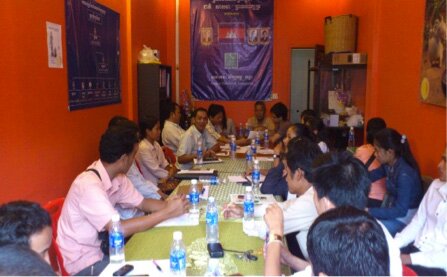
Siem Reap, Cambodia – In 2011, GIZ-RED Programme, in cooperation with the Siem Reap Provincial Department of Commerce, supported handicraft enterprises establish the Angkor Handicraft Association (AHA). Today, the non-profit business association represents the Siem Reap handicraft sector in private-public forums, such as Small and Medium Enterprise Private Sector Working Group meetings in Phnom Penh, that aim to improve the business climate in the handicraft sector.
AHA also offers important business development services to its members and implements various initiatives that strengthen the competitiveness of local handicraft producers. Meanwhile, AHA has grown from 15 founding members to its present 42 members.
GIZ-RED, and its programme partners, provide advice to AHA during the planning and implementation of AHA initiatives and assist with management and steering capacities of the association through trainings and seminars.
“Seal of Authenticity” promotes locally produced handicrafts
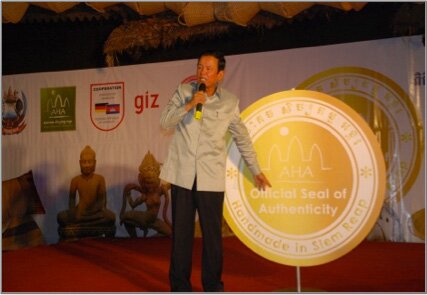
May 2013
Siem Reap, Cambodia – Each year tourists visiting the Angkor Wat temples in Siem Reap spend around USD100 million on souvenirs. Most tourists prefer locally produced handicraft products. Often, tourists are unable to distinguish local souvenir products from imported items. In order to make better use of the long-standing and untapped high demand for locally produced souvenir products AHA has introduced the “Seal of Authenticity.
The Seal guarantees that artisans from Siem Reap Province made the product. At present, 32 handicraft companies are using the Seal of Authenticity.
Design Competition” fosters the development of authentic souvenirs in Siem Reap
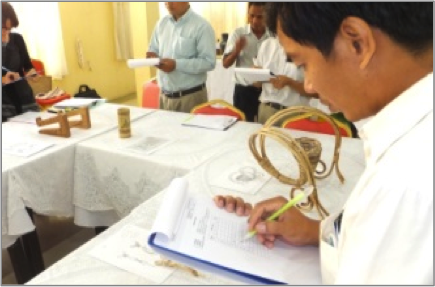
May 2013
Siem Reap, Cambodia – In 2012, AHA and its supporting partners, held the “1st Siem Reap Souvenir Design Competition”. The objective of the design competition is to facilitate links between university-level Cambodian design students and the handicraft sector. These links support the strengthening of product and design development. More than 100 participants developed souvenir designs in 5 different categories.
As 2012’s competition was a success, AHA is currently preparing for this year’s.
Providing market access for local handicraft producers – The Siem Reap Handicraft Trade Center and the AHA Souvenir Market
May 2013
Siem Reap, Cambodia – The recently opened Siem Reap Handicraft Trade Centre displays locally produced handicraft products from all handicraft sub-sectors in the area. The handicraft trade centre facilitates commercial connections between national and international traders and Siem Reap handicraft producers.
In addition to supporting the Siem Reap Handicraft Trade Centre, Angkor Handicraft Association (AHA) also provides trade related advice and services to Siem Reap handicraft enterprises and its national and international customers.
In 2012, AHA and its members jointly established the AHA Souvenir Market – the first and only Souvenir Market in Cambodia that displays only locally produced handicraft products. The market provides an additional trade platform for local handicraft producers, particularly for producers from rural areas who have limited access to customers.
Cambodian Organic Agricultural Association displays organic products at Cam-Inter Fair, 29-31 March 2013
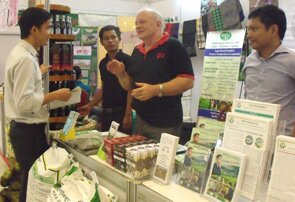
01 April 2013
Phnom Penh, Cambodia – GIZ partner COrAA (Cambodian Organic Agricultural Association) presented their diverse organic produce lines at the recent Cam-Inter Fair from 29-31 March 2013. The fair took place at Diamond Island (Koh Pich).
Several members of COrAA displayed certified foodstuffs such as rice, vegetables, fruits and pepper. Also on display were wild grape wine, textiles made from organic cotton as well as nutritional supplements prepared from Moringa. COrAA certifies organic products based on its Standards for Organic Crop Production and the Standards for Chemical-Free Crop Production.
For more information see www.coraa.org
The association is assisted by GIZ technical adviser Winfried Scheewe (second from right).
GIZ’s indigenous community land registration initiative ranks as largest effort to secure indigenous land rights in Cambodia
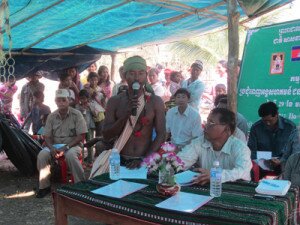
19 March 2013
Preparing 95 indigenous communities for collective land registration
Phnom Penh, Cambodia – In December 2012, GIZ’s Land Rights Programme signed an agreement to work with the International Labour Organization to help 90 indigenous communities in Cambodia take steps to prepare for the registration of their collective lands.
Following this, in January 2013 GIZ cooperation led to an additional five indigenous communities preparing for land registration. Altogether, this is the largest single effort any government or organization has ever made to assist indigenous communities in Cambodia secure their land rights. In 2001, a Land Law outlined indigenous communities’ land rights, and in 2009, a sub-decree on registering indigenous lands was issued. GIZ’s work builds on these legal documents.
First 5 indigenous communities register land – over 400 to follow
Cambodia has approximately 450 indigenous communities. Currently, the land of only five of these communities has been registered: three were registered with GIZ’s support, two with Canadian support
However, GIZ anticipates that through Canadian support three more communities will achieve registration by May 2013. The registration includes land that the indigenous peoples use for farming, residence, and for cultural purposes such as burial areas and spirit forests.
These eight communities are taking major steps in history, as they are the first to have ever applied for land registration. Others have taken various official steps that precede filing for land registration applications, which include receiving acknowledgement as an indigenous community by the Ministry of Rural Development and obtaining legal status recognition by Ministry of Interior. Legal status enables indigenous communities to hold land titles.
GIZ aims to help as many indigenous communities with land title applications as possible
A key objective of GIZ’s Land Rights Programme’s work is to help as many as possible with the land title application filing process.
Under a 2011 joint circular of the Ministries of Interior and of Land Management, Urban Planning and Construction the filing of these applications triggers provincial governors issuing interim protection letters for the lands specified in the applications. Once issued, these letters prohibit private transactions, but do not affect pre-issued concessions.
As stated in the circular, the letters do not apply to “those plots that the Royal Government has agreed in principle for investment or development – prior to these measures coming into effect.”
The concession exclusion poses serious limitations to issued letters’ effectiveness. Nevertheless, the letters are the only legal protection that currently exists until the community’s land registration process is complete.
For more information on GIZ’s Land Rights Programme, please contact: Mr. Poch Sophorn, Senior Advisor on Land Policy, Land Rights Program at [email protected].
Documentary raises consumer awareness on food safety
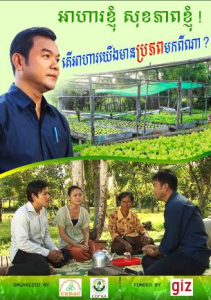
12 December 2012
Phnom Penh, Cambodia: Eighty people, including representatives of organic farmers’ groups of four provinces, consumers, students, journalists and staff members of the Centre d’Etude et de Développement Agricole Cambodgien / Cambodian Centre for Study and Development in Agriculture (CEDAC), the Cambodian Organic Agriculture Association (COrAA) and Deutsche Gesellschaft für Internationale Zusammenarbeit / (GIZ), gathered to celebrate the premiere of the documentary film My Food, My Health—Where does our food come from?
With support from the GIZ, the premiere was organized by the CEDAC and COrAA at the Cambodia-Japan Cooperation Center in Phnom Penh.
The documentary raises consumer awareness on food safety and organic agriculture, and promotes ‘food care’ among the public.
Following the screening, a Q&A session addressed viewers’ questions. The GIZ’s Country Director for Cambodia, Mr. Eberhardt, remarked:
‘There is no health without good food—and organic food is at the forefront of eating healthy. This documentary takes the viewer on a journey that tells the story of organic vegetable farming in Cambodia. It is not only informative, but encourages one to eat organic whenever possible’.
During the Q&A, the viewers obtained valuable information regarding food safety and organic agriculture. Moreover, they gained awareness about matters related to food production.
Towards the end of December, several TV stations in Phnom Penh broadcast the film more than 10 times. DVDs were distributed to bus companies, high schools and several universities to further raise awareness of food quality issues among travellers and students.
To view My Food, My Health—Where does our food come from?, visit GIZ Cambodia’s YouTube Channel: http://www.youtube.com/gizcambodia
GIZ supported organic fair-trade certified rice sets quality standards for a product in high-demand

March 9, 2013
Kampuchea Krom Boulevard, Phnom Penh, Cambodia – In 2004, CEDAC’s Organic Rice Market Programme shop, supported by GIZ, opened in Kampuchea Krom. Since the opening of the first shop, CEDAC’s organic rice labeled under the brand “Natural Agricultural Products”, gained popularity very quickly in retail locations throughout Phnom Penh.
CEDAC soon became a synonym for quality organic rice. Today, consumers continue to trust CEDAC’s organic quality control system.
Strengthening value chains – from rice field to fork
Since 2011,Technical Advisor Mr. Claudius Bredehöft and Technical Assistant Mr. Samorn Channa have supported the process with the aim to gain product value from the farmer’s field to consumers’fork.
“In our joined project between CEDAC and GIZ, we have to consider all stakeholders involved. We are starting with the farmers and their production environment and end with the needs of the customers in Cambodia as well as overseas”, Claudius Bredehöft summarizes.
Fairly grown in Cambodia, eaten world-wide
In 2008, CEDAC applied for international organic certification and successfully exported the first container of organic certified rice of Cambodian origin to the USA. Lotus Foods, the product’s market partner in the USA,strongly promotes SRI grown organic rice produced by small-scale farmers.
And by 2010, CEDAC became Fair TSA Standard certified, which assures fair production and work conditions, higher prices plus afair trade premium for community development. Last year, Germany received its first batch of CEDAC first organic certified rice through fair trade partner, EL PUENTE.
From subsistence to commercial gain – CEDAC’s vision
The Vision of CEDAC is to convert subsistence rice farmers to organic rice farm entrepreneurs or commercial organic fragrant rice producers. Through Fair trade standards, CEDAC generates extra funds for social development with international partners.
“By 2022, CEDAC plans to support up to 100,000 farmers to produce more than 400,000 tons organic fragrant paddy to supply the markets”, Dr. Yang Saing Koma, CEDAC´s President explains the ambitious targets of his organization.
300 Farmers certified, 700 more prepare for certification
In 2008, only one cooperative in Takeo Province was certified. Today approx. 300 Farmers in Takeo, Kampong Chhnang and Kampong Speu are certified and 700 more farmers prepare for international certification. To qualify for certification, farmers have to demonstrate that they manage their farms without any chemical inputs for at least 3 years.Every year, CEDAC’s Internal Control System, under the supervision of CEDAC’s Program Director for Health & Environment Mr. Keam Makarady is certified by an accredited certification body, BCS ÖkoGarantie GmbH.
The heart of CEDAC’s Internal Control System is the ICS Handbook in which the farmers have to record all their farm activities. Additionally, the entire supply chain of the organic rice has to be inspected to assure that it has not had any contact with any hazardous chemicals. The new CEDAC warehouse stores organic rice only to ensure highest standards possible. The two rice mills have to follow strict rules to reach international organic standards.
Mr. Sou Savorn, Operation Manager of CEDAC Sahakreas, is responsible for the paddy buying, processing and export of the organic rice.
“Our product is very popular – We do not have enough organic certified rice for our customers available”, he explained. Last year, CEDAC Sahakreas exported 105 tons of organic fair trade certified rice to Germany and the USA. This year, exports will double – and are anticipated to reach over 200 tons. Other customers in Canada, France, Germany, Malaysia and the Netherlands are awaiting the opportunity to import CEDAC’s products.
For more information on CEDAC’s Organic Rice Programme contact:
Mr. Claudius Bredehöft
E-Mail: [email protected]
Tel: +855 12 215 430
Public-Private Collaboration transforms small-holder agriculture in Siem Reap province
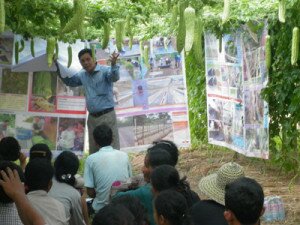
25 February 2013
Siem Reap, Cambodia – GIZ’s Regional Economic Development (RED) – Green Belt Programme operates in the Siem Reap province of Cambodia to foster the competitive integration of agricultural producers and small-scale businesses in commercial markets.
In particular, the programme supports thousands of producers in the province who are engaged in vegetable farming. The production and commercialization of vegetables has the potential to generate revenues that complement incomes and allows investments in economic assets as well as household health and education.
Addressing small-holder challenges
Small-holders, however, are often disconnected from markets, have limited resources to scale up production or access new technologies and are caught in potentially harmful cycles of economic and social degradation. Developing small-holder agriculture requires providing technical expertise and know-how, which is often difficult to deliver in rural areas and costly for farmers.
In order to address this challenge, RED has promoted the establishment of partnership agreements between Provincial Department of Agriculture (PDA) and agricultural input companies.
Input producers and distributors, such as seed, fertilizer or agrochemical companies, have a strong interest to promote the development of the vegetable sector from the subsistence to the commercial level, since their business depends on having a growing number of commercial producers as clients.
Public-private sectors support over 4,00 farmers
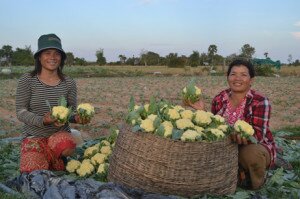
Private sector companies can contribute to increase farm productivity by commercializing quality inputs in rural areas (e.g. high yield and climate tolerant seeds or safe pesticides). Additionally, they can provide extension services to farmers such as training and technical advice related to the correct and effective application of their products.
The public sector plays a key role to catalyze the interventions of private sector companies in support of small-holders. Since 2009, RED and the Provincial Department of Agriculture have teamed up with agricultural input companies to benefit vegetable producers in Siem Reap. Meanwhile, PDA technical staff operate as an aggregating entity that identify and channel the demand of farmers for technical support, which facilitates service delivery by private sector companies.
Jointly, the public and private sector have supported the dissemination of modern techniques and technologies to over 4,000 farmers. As a result, vegetable growers in Siem Reap have increased and diversified production, which generates, on average, an additional income of USD 159 per year, per household.
At present, the RED programme is supporting PDA to develop partnerships with new companies and extend existing collaborations, tailored to the changing requirements of a sector in transformation.
